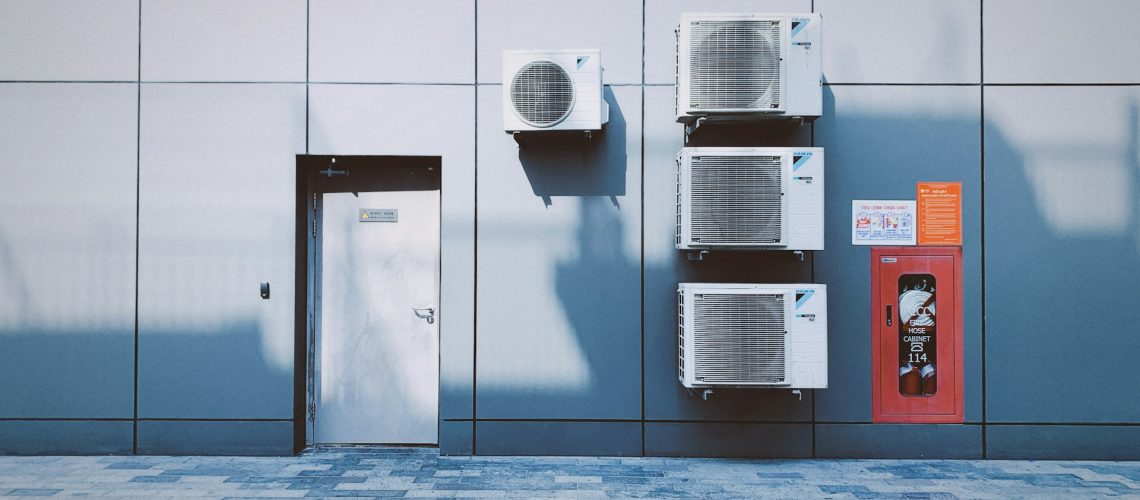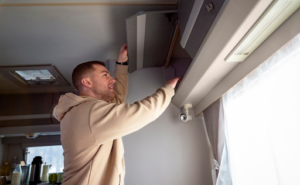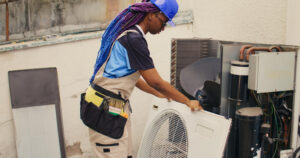Menu

How to Choose and Maintain the Best HVAC System for Your Commercial Space in British Columbia
Choosing the right HVAC system for your commercial property in British Columbia can be a challenging task, given the wide range of options on market. It’s essential to select an HVAC system that not only meets your property’s unique needs but also operates efficiently and reliably over time.
In this article, we will explore the various factors to consider when selecting an HVAC system for your commercial space, such as size, energy efficiency, and specific climate requirements. Additionally, we will provide tips for maintaining your HVAC system to ensure its optimal performance and longevity.
Situated across the Lower Mainland and Fraser Valley, cities like Abbotsford, Chilliwack, Langley, Vancouver, Richmond, Burnaby, Coquitlam, Delta, Surrey, and Maple Ridge experience diverse weather conditions.
As a result, commercial property owners must consider climate-related factors when determining the best HVAC system for their buildings. Climate conditions can significantly impact the efficiency and effectiveness of an HVAC system, so it’s crucial to take local temperature and humidity patterns into account when making your selection.
Aside from the climate, it is vital to ensure your HVAC system is appropriately sized for your commercial property. An oversized or undersized system can lead to increased energy consumption, uneven temperature regulation, and reduced equipment lifespan.
To ascertain the appropriate system size, it’s essential to consult with a knowledgeable HVAC professional, who can assess your property’s specific requirements and recommend the best-suited equipment.
Energy efficiency is another crucial factor to factor in when selecting an HVAC system. Investing in energy-efficient equipment not only helps reduce environmental impact but can also lead to significant cost savings over time. Look for systems boasting energy certifications and high SEER (Seasonal Energy Efficiency Ratio) or AFUE (Annual Fuel Utilization Efficiency) ratings to ensure you’re making a wise investment.
Once you’ve chosen the ideal HVAC system for your commercial property, it’s crucial to follow proper maintenance procedures to keep it running efficiently and effectively for years to come. In the following sections, we will delve deeper into the best practices for commercial HVAC maintenance, covering tasks such as regular inspections, filter replacements, and addressing potential issues before they escalate into significant problems.
Climate Considerations for HVAC Systems
One of the essential factors to keep in mind when selecting an HVAC system for your commercial property is your local climate. British Columbia’s Lower Mainland and Fraser Valley experience a range of weather conditions, which can significantly impact an HVAC system’s efficiency and effectiveness. Consider the following climate-related factors when choosing an HVAC system for your commercial building:
- Temperature Ranges: Select an HVAC system that can efficiently handle your region’s temperature extremes, whether it’s bitter cold in the winter months or sweltering heat in the summer season.
- Humidity Levels: High humidity levels can strain an HVAC system and lead to decreased efficiency. Ensure your chosen system is equipped to manage humidity effectively to maintain a comfortable indoor environment.
- Climate-Specific Features: In regions with colder climates, consider investing in an HVAC system that can also provide heating, such as heat pumps or combination furnace-air handler systems. Similarly, in areas with high humidity, opt for systems with advanced humidity control features.
Determining the Appropriate HVAC System Size
An appropriately sized HVAC system is crucial not only for maintaining a comfortable environment within your commercial property but also for ensuring efficient energy consumption and optimal equipment lifespan. To calculate the proper system size, follow these steps:
- Consult with an HVAC Professional: A knowledgeable HVAC expert can assess your commercial property’s specific requirements and recommend the best-suited system size, taking into account factors such as property size, insulation, and latent heat gain.
- Perform a Load Calculation: To determine the precise heating and cooling capacity needed for your commercial space, an HVAC professional should perform a load calculation. This involves analyzing various aspects of your property, such as square footage, building layout, and insulation levels.
- Avoid Oversizing or Undersizing: An oversized or undersized HVAC system can lead to increased energy consumption and uneven temperature regulation. Make sure you select an appropriately sized system to avoid these issues.
Energy Efficiency in Commercial HVAC Systems
Investing in an energy-efficient HVAC system can lead to significant cost savings over time and minimize your property’s environmental impact. Here are some tips for choosing an energy-efficient system:
- Look for Energy Certifications: HVAC systems that possess energy certifications, such as ENERGY STAR, are designed to meet strict energy efficiency guidelines set forth by government bodies. These certifications can help you identify which systems are most eco-friendly and cost-effective.
- Check SEER and AFUE Ratings: The Seasonal Energy Efficiency Ratio (SEER) applies to cooling equipment, while the Annual Fuel Utilization Efficiency (AFUE) rating pertains to heating systems. Higher ratings indicate better energy efficiency; opt for systems with high SEER or AFUE ratings to minimize energy consumption and utility costs.
- Consider System Features: Advanced features, such as variable-speed motors, multi-stage compressors, and programmable thermostats, can contribute to increased energy efficiency within your HVAC system.
Best Practices for Commercial HVAC Maintenance
Proper maintenance is essential for keeping your commercial HVAC system running smoothly over the long term. Incorporate these best practices into your maintenance routine:
- Regular Inspections: Schedule routine inspections with a professional HVAC technician to examine your system for potential issues and ensure its continued optimal performance.
- Filter Replacements: Regularly cleaning or replacing air filters helps maintain proper airflow and enhance overall system efficiency. Aim to replace your filters every one to three months, depending upon your specific system and environmental factors.
- Belt and Pulley Maintenance: Inspecting and maintaining belts and pulleys can extend their lifespan and ensure efficient operation. Consult with an HVAC professional to establish a maintenance schedule for these components.
- Coil Cleaning and Inspection: Dirty evaporator and condenser coils can negatively impact the efficiency of your HVAC system. Schedule routine cleaning and inspections to maintain efficient heat transfer and prevent costly equipment breakdowns.
Conclusion
Choosing and maintaining the best HVAC system for your British Columbia commercial property requires careful consideration of factors such as climate, system size, and energy efficiency. By consulting with an experienced HVAC professional and adhering to proper maintenance practices, you can ensure your system operates at peak performance for years to come. Remember, a well-functioning HVAC system not only contributes to your property’s comfort but also promotes energy conservation and cost savings, allowing your business to thrive in an eco-friendly and financially responsible manner.
Are you looking for the best HVAC system for your commercial space in British Columbia? Look no further than Bromac! Our team of experts is here to help you choose the perfect HVAC system for your unique needs and budget. From installation to maintenance, we’re committed to providing exceptional service and support to keep your HVAC system running smoothly all year long. Contact us today to schedule your consultation and discover the benefits of choosing Bromac for all your HVAC maintenance needs.


